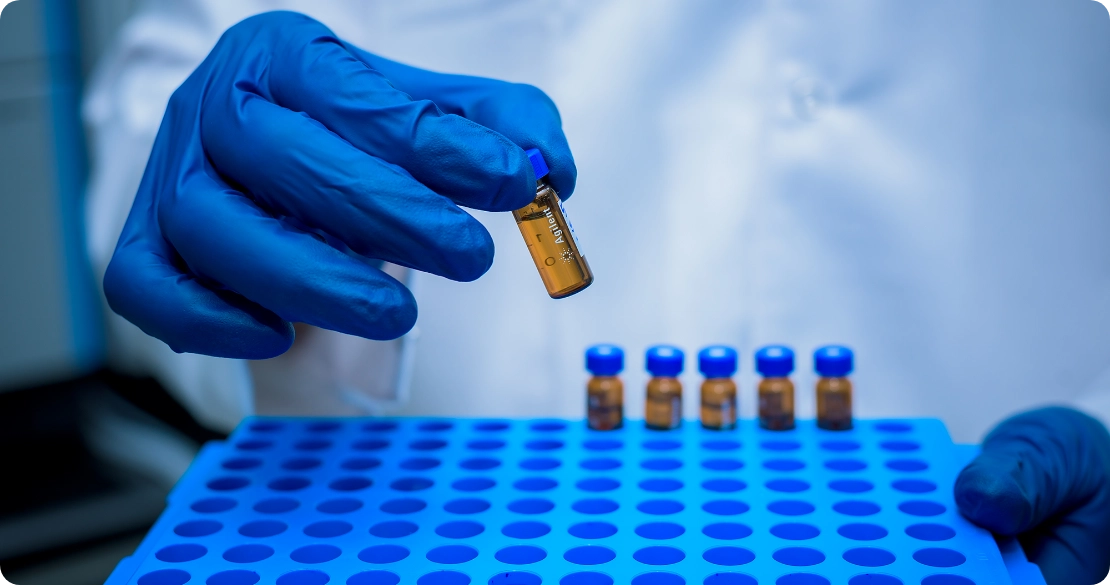Scientific rigor and cross-functional collaboration propelled the advancement of discovery programs across multiple therapeutic areas. Leveraging cutting-edge platforms, digital technologies, and integrated capabilities, we delivered impactful solutions that create value for our customers.
Our Research Services division includes Discovery Chemistry, Discovery Biology, Safety Assessment, and Computational & Data Sciences, along with SynVent (expert-led, integrated therapeutic discovery), Translational & Clinical Research, and dedicated centers for clients.
Research Services recorded moderate growth in FY25, driven by increased R&D externalization by large pharma and supplier diversification away from China, benefiting India-based CROs. However, reduced venture capital funding for early-stage companies tempered typical growth in that segment.
Clients shifting research from China to India favored pilot-scale engagements to initiate relationships. Of 13 such pilots, six have converted to long-term partnerships, with five still in progress, contributing to steady growth and a strong future pipeline. Increased customer visits and audits further indicated recovery momentum. To support this, Syngene continued investing in capacity, including facility expansions in Hyderabad.
Discovery Biology advanced scientific innovation, operational efficiency, and capabilities. Investments in advanced automation for DMPK assays improved both quality and turnaround times. A key milestone was the implementation of a centralized compound management system, integrated with AI-powered software, enhancing speed, standardization, traceability, and inventory control.
We strengthened biological target validation and iPSC platforms and expanded therapeutic antibody discovery capabilities, including a proprietary llama-derived antibody library and a bispecific antibody platform. This enabled the progression of two bispecific antibodies from hit identification to candidate selection and supported regulatory submission preparations.
To meet growing demand, we scaled antibody drug congugates (ADC) discovery at the Bengaluru site. The DMPK business also grew, backed by infrastructure and expertise enhancements.
Discovery Chemistry onboarded new clients through successful pilot projects, many transitioning into full-time equivalent (FTE) models. We expanded our peptide chemistry platform in Bengaluru with advanced instrumentation and expert hires to support complex synthesis. Progress in ADCs, prodrug design, and fragment-based drug discovery (FBDD) reflected our focus on emerging modalities.
Our teams advanced multiple integrated drug discovery (IDD) programs from hit identification to development candidate nomination, collaborating across medicinal chemistry, DMPK, biology, and structural biology – resulting in publications, patents, and scientific recognition.
Digitalization efforts included real-time productivity dashboards, predictive retrosynthesis tools, and an integrated analytical workflow platform. We also enhanced our scientific toolkit with expanded access to commercial software and SARchitect™, our proprietary 3D visualization and modeling application.
In line with sustainability goals, we launched a My Green Lab certification pilot in Hyderabad and increased reaction screening capacity. Internal collaboration was strengthened through knowledge-sharing initiatives such as journal clubs.
We continue to adopt enabling technologies like photoredox and electrochemistry, and leverage AI and data analytics for faster hypothesis generation and decision-making. Our prodrug chemistry team won top honors for a poster presentation at a global healthcare conference, and we deepened academic engagement through expert lectures and technical forums.
The unit reinforced its role as a full-spectrum partner for early‑phase clinical development, executing complex studies across therapeutic areas, including our first hybrid, decentralized Phase 2 trial in idiopathic pulmonary fibrosis, which integrated blinding, encapsulation, and digital endpoints.
We completed a challenging biosimilar study under tight timelines and regulatory scrutiny, while other programs, such as an ulcerative colitis study, showcased end-to-end capabilities in kit preparation, esoteric testing, and flow cytometry. Our medical writing team also delivered several standalone projects.
The Bioanalytical Large Molecule (BAL) lab advanced its support for emerging modalities like ADCs, oligonucleotides, and recombinant peptides. Highlights included method development for antidiabetic and anti-obesity peptides, chiral assays, expanded biomarker testing, and PK support for recombinant drugs.
We deepened scientific collaborations in complex vaccine and biosimilar trials, including projects with the World Health Organization and a growing North American CRO partnership.
Progress on our digital roadmap included completing planned upgrades to ELNs, Laboratory Information Management System (LIMS), and clinical trial applications, with full digital transition expected by FY26. These enhancements support real-time monitoring, reduce documentation burden, and enable integrated clinical operations. Additional improvements included upgraded analytical software and centralized imaging systems for global sponsor needs.
Process excellence remained a focus through instrumentation upgrades, cross-training, and the addition of analytical writing. New quality checkpoints were added for BA/BE trials, and a Six Sigma initiative significantly cut bioequivalence project timelines by nearly half.

The unit continued to accelerate drug discovery through AI, automation, and advanced analytics. Enhancements to our proprietary platform, Syn.AI™, enabled data-driven design and optimization of therapeutic antibodies, novel target identification, and multiparameter optimization for small molecules and biologics.
We also digitized project tracking and analytics for small molecule programs, providing clients with real-time visibility into synthesis and assay progress – supporting faster decisions, streamlined workflows, and reinforcing Syngene’s position as a tech-enabled innovation partner.
The BAL team received the National Convention on Quality Concepts (NCQC) Excellence Award and the Chapter Convention on Quality Concepts (CCQC) Gold Award for their project on reducing Cost of Poor Quality (COPQ), recognizing excellence in quality and process improvement.
The Medical Writing team lead received the “Hall of Fame” award from Indian Society for Clinical Research (ISCR), and the team played a key role in organizing the first-ever ISCR Symposium on Medical Writing.
Our Clinical Laboratory was recognized by the College of American Pathologists for sustaining over 15 years of excellence in high-quality laboratory care.